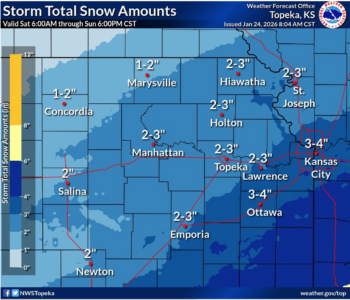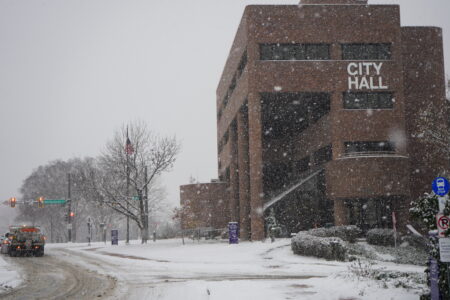Heartland Community Health Center to receive $1.1 million over two years to expand mental health and substance use disorder services

photo by: Contributed
The ribbon cutting ceremony for Heartland Community Health Center's Bluestem Wellness Building, 534 Michigan St., on Thursday, September 26, 2024.
To further integrate mental health and substance abuse disorder treatments into its primary care services, Heartland Community Health Center will be receiving more than a million dollars in federal funding from an initiative aiming to improve behavioral health care nationwide.
Heartland will be receiving $1.1 million over the course of two years from the Health Resources and Services Administration, or HRSA. This funding will be used to incorporate more behavioral health services into Heartland’s primary care clinics, ensuring comprehensive care for the uninsured, underinsured, and insured populations.
“We view this as a win for the community because we know that it takes all of us in this work to make a difference,” Heartland CEO Julie Branstrom said. “I think because Heartland is a federally qualified health center, we were the only organization in town that has access to apply for these dollars.”
In Kansas, Heartland was one of six federally qualified health centers, which provide a range of services to underserved populations, to receive this award. The funding is a part of a $240 million national effort to improve behavioral health services in more than 400 community health centers that collectively serve over 10 million Americans.
“We view this as one of the benefits that a federally qualified health center can bring to its community,” Branstrom said. “These (are) types of grant opportunities that we can go after that our partners didn’t have access to.”
The center applied for the grant with the intention of addressing unmet needs and barriers affecting Heartland’s patient population and service area “by expanding access to care, improving health outcomes through integrated care, increase in specialized and preventative care, improvement in quality assurance, and most importantly, building community resilience,” according to a narrative in the grant application.
According to data collected by Heartland, in 2023, 99.4% of Heartland patients with substance use disorder saw a primary care provider, but only 26.6% saw a behavioral health specialist. Increasing the number of staff members and specialists is expected to reduce the care gap and allow for care to be seamlessly coordinated between needed specialists.
Branstrom said that this grant will enable the center to enhance its services for individuals struggling with substance use disorders. Specifically, it will support the addition of group therapy sessions, where patients can engage with others facing similar challenges in a shared therapeutic setting. In addition, Heartland plans to hire a care specialist who will provide personalized support for patients in recovery.
A large portion of this grant funding will be allocated to hiring experienced professionals focused on mental health and addiction recovery. This includes a psychiatric advanced practice registered nurse along with a care team comprising a care coordinator, nurse and medical assistant. Additionally, the funding will support the recruitment of a licensed addiction counselor, a substance use disorder care coordinator and several other key positions.
“We really are hoping to bring new providers to our community that aren’t already here,” Branstrom said. “… We are really wanting to add to our community’s existing capacity, and so we’re hopeful that we’ll have some candidates from outside of this community that will be applying for these positions.”
Branstrom said that Heartland will continue to collaborate with community partners to provide behavioral health services and create new opportunities for partnership.
“As we begin to think about how to operationalize this work at Heartland, we really want to gather all of our partners that also play a really critical role in this work together to get clear on what everybody’s role is and how we all work together to ensure that people in our communities have access to these services.”
Heartland is anticipating that it will have job postings for its new positions this week. Branstrom added that while recruiting providers is never easy or quick, she imagines that this work would begin to be implemented in the first quarter of 2025.

photo by: Contributed
From left to right, Behavioral Health Care Coordinator Lead Briley Young, Licensed Clinical Marriage & Family Therapist Megan Lowe, Licensed Specialist Clinical Social Worker Jenny Robinson, Dr. Meaghan McEachern, PsyD, Licensed Specialist Clinical Social Worker Megan Thiefolf, Licensed Clinical Professional Counselor Brianna Johnson at the ribbon cutting ceremony for Bluestem Wellness building.







